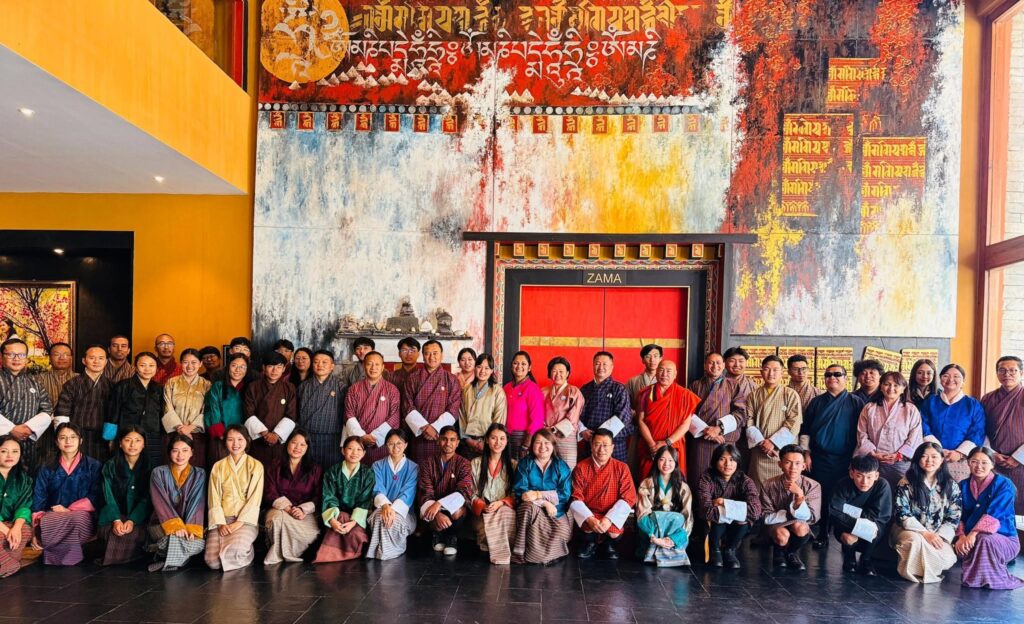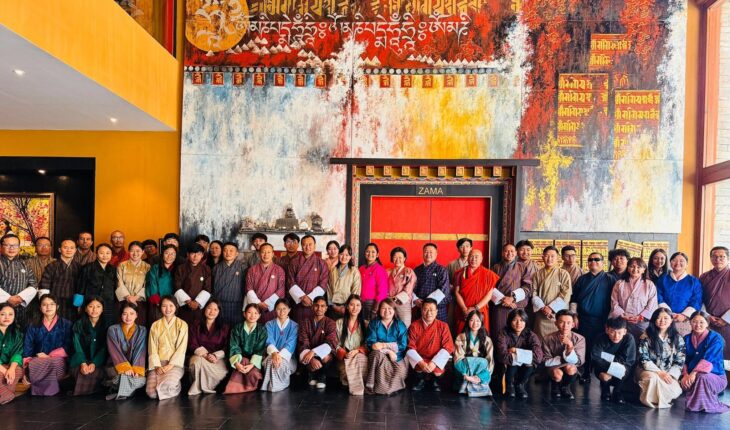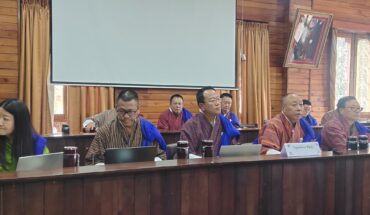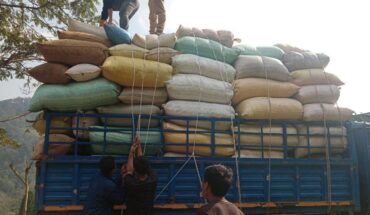
TIL BDR GHALLEY
Thimphu
In a move to amplify youth participation in climate policy, Bhutanese youth presented their national consultation report at a high-level event in Thimphu, urging for urgent and inclusive climate action.
“Youth and Climate Change in Bhutan and NDC 3.0: Presentation of Youth Consultation Report – Their Perspectives and Recommendations,” marked a crucial milestone in Bhutan’s effort to engage young people in the drafting of its third Nationally Determined Contributions (NDC 3.0) under the Paris Agreement.
Jointly organized by the Programme and Youth Coordination Division, the Department of Environment and Climate Change under the Ministry of Energy and Natural Resources (MoENR), and UNICEF Bhutan.
The event convened more than 25 youth representatives from across the country, alongside senior government officials, Members of Parliament, development partners, and civil society leaders.
The event was led by youth presenters and speakers, underscoring their growing leadership in climate action. The presentation of the Youth Consultation Report, which compiled collectives voice, perspectives, insights, and policy recommendations from consultations held across six regions: Wangduephodrang, Sarpang, Thimphu, Mongar, Paro, and Phuntsholing.
A total of 106 in person and 639 virtually young Bhutanese participated in these consultations, sharing their lived experiences, pressing concerns, and proposed solutions to the climate challenges affecting their communities.
“The survey was structured around five thematic areas,” she said, “namely Education; Water, Sanitation, and Hygiene (WASH); Disaster; Health and Mental Wellbeing; and Gender Vulnerability.”
“For Bhutanese youth, climate change is not merely a topic for discussion or awareness—it is a tangible challenge that we live with every day,” said youth representative and member of the Thimphu Youth Centre Kezang Norbu Choden during the event.
“Young people are disproportionately affected, yet we bring energy, creativity, and a fresh approach to climate solutions. We must be included—not tomorrow, but now.” she said.
“Youth engagement in climate policy is not optional but essential,” she emphasized, noting that approximately 41 percent of Bhutan’s population comprises young people—making them a critical stakeholder in climate action. However, the youth face increasing risks to health, education, employment, and food security as the impacts of climate change intensify.
The report also highlighted the severe implications of climate change in Bhutan. Seasonal flash floods and landslides frequently block access to schools in remote areas, disrupting attendance and the continuity of learning.
Many schools in high climate vulnerability zones are witnessing a rise in student dropout rates, a trend worsened by the poor integration of climate education and inadequate infrastructure.
Water shortages emerged as a serious concern in several regions. Unhygienic conditions caused by the lack of clean water often force students to miss school.
In some communities, water scarcity renders toilets unusable, resulting in open defecation and further jeopardizing health and dignity.
The report raised key challenges, such as the lack of climate education in schools, limited access to mental health support to address climate-related anxiety, inadequate opportunities for youth participation in policymaking, and poor disaster preparedness in rural communities.
Participants also drew attention to gender-specific vulnerabilities and unequal access to essential services like water, sanitation, and hygiene (WASH), particularly in climate-vulnerable areas.
Despite these barriers, the report offered a strong slate of youth-led solutions. These included expanding climate education into the national curriculum, supporting school-based environmental clubs, improving waste management systems, increasing tree-planting initiatives, and creating platforms for youth to engage directly with climate governance structures.
The report also called for investments in green entrepreneurship, localized awareness campaigns, and dedicated funding for youth-led projects.
Reinforcing the inclusion, Karma Tshering, Secretary of the Ministry of Energy and Natural Resources and Chairperson of the National Environment Commission, acknowledged the urgency of youth involvement.
“Climate change not only disrupts education but also threatens access to clean water, sanitation, and a safe environment for Bhutan’s future generations,” he said.
“It is essential for youth voices to be not only heard but embedded meaningfully in development planning. This inclusion builds the leadership capacity of young people to respond to the crisis—and to eventually lead climate action in their communities and beyond.”
UNICEF Bhutan Representative Ms. Rushnan Murtaza emphasized the importance of prioritizing children and adolescents in national climate strategies.
“Children make up more than a third of the world’s population, yet fewer than half of national climate plans globally reflect their needs,” she noted. “Only 2.4 percent of global climate financing is directed toward them.”
She also pointed out that girls, children with disabilities, and those from marginalized communities are often the first to suffer and last to be heard. Murtaza called for a paradigm shift in youth engagement, stating that children and young people must not be treated merely as recipients of climate policies, but as contributors and innovators.
“Investing in youth leadership and promoting intergenerational collaboration is the key to building a future that is not only sustainable, but also just and inclusive,” she added.
A panel discussion followed the report presentation, featuring a Member of Parliament, a youth activist, an environmentalist, and a curriculum expert.
The panel explored how Bhutan’s climate ambitions can be aligned with youth aspirations, and how national policies can better support young people to lead change.
In a significant announcement, the Ministry of Energy and Natural Resources confirmed that the Youth Consultation Report will be directly referenced in the drafting process of Bhutan’s NDC 3.0. The report is expected to serve both as a policy tool and an advocacy document across government agencies and youth networks.
Gracing the event as Chief Guest was the Secretary of MoENR, joined by the Director of the Department of Education Programmes, the UNICEF Bhutan Representative, and several leaders from civil society organizations.
The event concluded with a powerful and collective youth pledge, who pledge, “We are future stakeholders who will face long-term climate impacts. We bring innovative ideas and fresh perspectives. We are ready to be part of the change we seek.”
Youth step-up climate fight with strong policy demands
Voices from six regions inform NDC 3.0 draft; Government pledges to integrate recommendations
TIL BDR GHALLEY
Thimphu
In a move to amplify youth participation in climate policy, Bhutanese youth presented their national consultation report at a high-level event in Thimphu, urging for urgent and inclusive climate action.
“Youth and Climate Change in Bhutan and NDC 3.0: Presentation of Youth Consultation Report – Their Perspectives and Recommendations,” marked a crucial milestone in Bhutan’s effort to engage young people in the drafting of its third Nationally Determined Contributions (NDC 3.0) under the Paris Agreement.
Jointly organized by the Programme and Youth Coordination Division, the Department of Environment and Climate Change under the Ministry of Energy and Natural Resources (MoENR), and UNICEF Bhutan.
The event convened more than 25 youth representatives from across the country, alongside senior government officials, Members of Parliament, development partners, and civil society leaders.
The event was led by youth presenters and speakers, underscoring their growing leadership in climate action. The presentation of the Youth Consultation Report, which compiled collectives voice, perspectives, insights, and policy recommendations from consultations held across six regions: Wangduephodrang, Sarpang, Thimphu, Mongar, Paro, and Phuntsholing.
A total of 106 in person and 639 virtually young Bhutanese participated in these consultations, sharing their lived experiences, pressing concerns, and proposed solutions to the climate challenges affecting their communities.
“The survey was structured around five thematic areas,” she said, “namely Education; Water, Sanitation, and Hygiene (WASH); Disaster; Health and Mental Wellbeing; and Gender Vulnerability.”
“For Bhutanese youth, climate change is not merely a topic for discussion or awareness—it is a tangible challenge that we live with every day,” said youth representative and member of the Thimphu Youth Centre Kezang Norbu Choden during the event.
“Young people are disproportionately affected, yet we bring energy, creativity, and a fresh approach to climate solutions. We must be included—not tomorrow, but now.” she said.
“Youth engagement in climate policy is not optional but essential,” she emphasized, noting that approximately 41 percent of Bhutan’s population comprises young people—making them a critical stakeholder in climate action. However, the youth face increasing risks to health, education, employment, and food security as the impacts of climate change intensify.
The report also highlighted the severe implications of climate change in Bhutan. Seasonal flash floods and landslides frequently block access to schools in remote areas, disrupting attendance and the continuity of learning.
Many schools in high climate vulnerability zones are witnessing a rise in student dropout rates, a trend worsened by the poor integration of climate education and inadequate infrastructure.
Water shortages emerged as a serious concern in several regions. Unhygienic conditions caused by the lack of clean water often force students to miss school.
In some communities, water scarcity renders toilets unusable, resulting in open defecation and further jeopardizing health and dignity.
The report raised key challenges, such as the lack of climate education in schools, limited access to mental health support to address climate-related anxiety, inadequate opportunities for youth participation in policymaking, and poor disaster preparedness in rural communities.
Participants also drew attention to gender-specific vulnerabilities and unequal access to essential services like water, sanitation, and hygiene (WASH), particularly in climate-vulnerable areas.
Despite these barriers, the report offered a strong slate of youth-led solutions. These included expanding climate education into the national curriculum, supporting school-based environmental clubs, improving waste management systems, increasing tree-planting initiatives, and creating platforms for youth to engage directly with climate governance structures.
The report also called for investments in green entrepreneurship, localized awareness campaigns, and dedicated funding for youth-led projects.
Reinforcing the inclusion, Karma Tshering, Secretary of the Ministry of Energy and Natural Resources and Chairperson of the National Environment Commission, acknowledged the urgency of youth involvement.
“Climate change not only disrupts education but also threatens access to clean water, sanitation, and a safe environment for Bhutan’s future generations,” he said.
“It is essential for youth voices to be not only heard but embedded meaningfully in development planning. This inclusion builds the leadership capacity of young people to respond to the crisis—and to eventually lead climate action in their communities and beyond.”
UNICEF Bhutan Representative Ms. Rushnan Murtaza emphasized the importance of prioritizing children and adolescents in national climate strategies.
“Children make up more than a third of the world’s population, yet fewer than half of national climate plans globally reflect their needs,” she noted. “Only 2.4 percent of global climate financing is directed toward them.”
She also pointed out that girls, children with disabilities, and those from marginalized communities are often the first to suffer and last to be heard. Murtaza called for a paradigm shift in youth engagement, stating that children and young people must not be treated merely as recipients of climate policies, but as contributors and innovators.
“Investing in youth leadership and promoting intergenerational collaboration is the key to building a future that is not only sustainable, but also just and inclusive,” she added.
A panel discussion followed the report presentation, featuring a Member of Parliament, a youth activist, an environmentalist, and a curriculum expert.
The panel explored how Bhutan’s climate ambitions can be aligned with youth aspirations, and how national policies can better support young people to lead change.
In a significant announcement, the Ministry of Energy and Natural Resources confirmed that the Youth Consultation Report will be directly referenced in the drafting process of Bhutan’s NDC 3.0. The report is expected to serve both as a policy tool and an advocacy document across government agencies and youth networks.
Gracing the event as Chief Guest was the Secretary of MoENR, joined by the Director of the Department of Education Programmes, the UNICEF Bhutan Representative, and several leaders from civil society organizations.
The event concluded with a powerful and collective youth pledge, who pledge, “We are future stakeholders who will face long-term climate impacts. We bring innovative ideas and fresh perspectives. We are ready to be part of the change we seek.”





